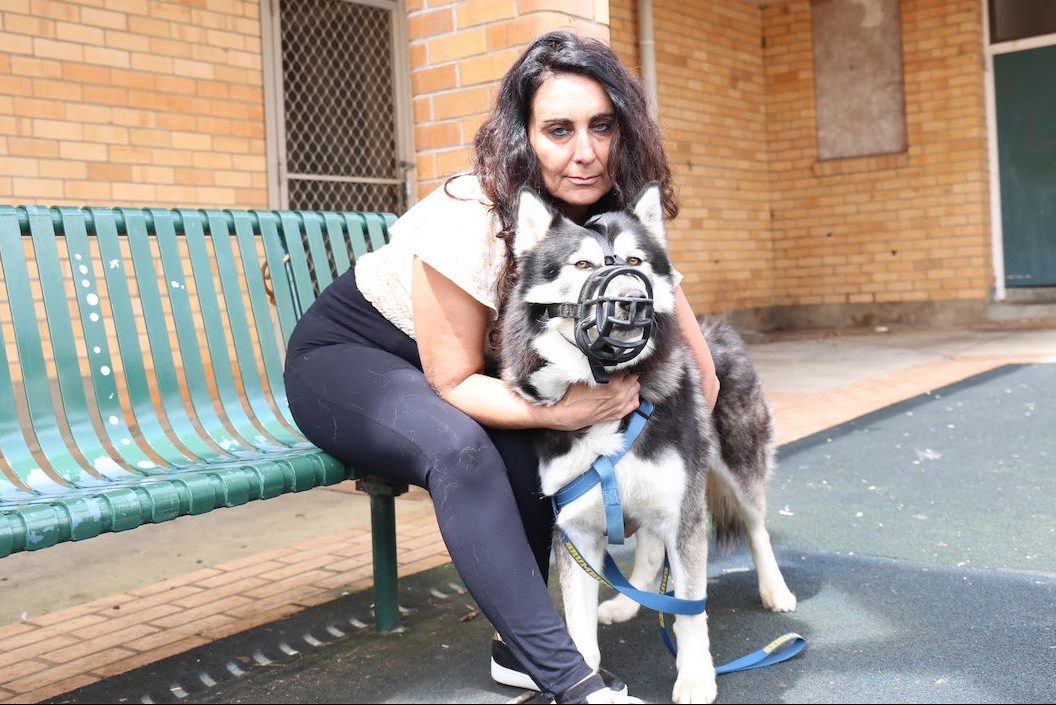
A SIBERIAN husky impounded for almost three months following an attack on a kangaroo has been returned to its owner, malnourished and traumatised by the lengthy separation.
Six-year-old Ace attacked a kangaroo while off leash near the Hawker oval in early August. It was seized by rangers from the ACT’s Domestic Animal Services (DAS) and impounded pending an investigation into the incident.
Ace’s owner Silvia Gabrielli said her “gentle and beautiful dog” is now a “shadow of his former self” having lost 4.5 kilograms while in the care of the pound.
“He’s thin and looks awful,” said Gabrielli, 55.
“When I got him back he was dirty, stinky and like a skeleton.
“It’s almost as if he’s not the same dog.”
Ace’s lengthy impoundment is not out of the ordinary, with many seized animals spending long periods separated from their homes and owners while investigations are ongoing.
“I’m one of many people who have had their pets seized for an extended amount of time, one woman I know had her dogs impounded for four months,” said Gabrielli.
“Keeping dogs impounded for months on end is cruel and inhumane, it’s disgraceful really.”
Volunteer solicitor with the Animal Defenders Office (ADO), Tara Ward, said animals subjected to long impoundments have become commonplace since the ACT government amended legislation to permit investigations to extend beyond 28 days duration.

“Up until December 2017, the Domestic Animals Act in the ACT put a 28-day limit on an investigation time and after that they have to start prosecution for an offence, issue a fine or release the dog,” Ward said.
“What we found was that DAS was routinely breaching that. Rather than changing their processes so they could conduct the investigation in a more timely manner they changed the law, basically giving them the power to extend that time frame indefinitely.
“They can hold a dog pending an investigation for as long as they want so we are now finding it gets extended for 30, 60, 90 days.”
Ward co-founded the ADO, a national organisation based in Canberra, in 2014. One of its many functions is to provide legal advice for the owners of impounded pets.
“We routinely deal with clients who have had their dogs impounded for months, sometimes well over a year,” Ward said.
“We are absolutely smashed by the number of people who are going through what Silvia is going through.”
Ward has expressed concern for the welfare of dogs impounded for a long period of time.
“When a dog that’s used to living with a family suddenly ends up in a small concrete cell with no stimulation, very little enrichment, and who knows what exercise, the impact on their mental wellbeing would be immense,” she said.
The situation has been made worse by a lack of adequate resourcing of the investigating agency, Ward said.
“They [DAS] simply lack the staff to conduct the investigations because they are time consuming and involve property inspections, talking to neighbours, looking at CCTV footage,” she said.
She is also critical of the lack of communication with families while their pet was impounded.
“DAS goes into shut-down mode and they don’t communicate with the owners of the dogs… people are traumatised by the experience.”
Ward’s account of poor communication resonates with Gabrielli who felt she was ignored by DAS during the time Ace was impounded.
“Once they have your dog they don’t return calls, you can’t get in touch with them, they play God with your dog,” she said.
Although now happily reunited with Ace, Gabrielli – who lives alone and has anxiety – is still dealing with the trauma of the lengthy separation while the agency took its time with the investigation.
Of most concern to Ace’s owner was the six weeks it took for a behavioural study to be completed.
“Six weeks for a report outcome is an outrageous time frame, it should take no more than 24 hours,” she said.
While the investigation found that Ace had no significant behavioural problems, the dog is required to wear a muzzle while out in public as a result of the incident.
Gabrielli believes it’s time the ACT government considered revisiting its decision to extend the time of investigations, and to also bolster the agency’s staffing level so that investigations can be carried out in a timely manner.
“Speed up investigation time frames, get more staff, and treat the animals and their owners better,” she said.
A spokesperson for Transport Canberra and City Services said the length of an investigation may vary depending on a number of factors including the complexity of the case.
Welfare compliant standards of care are met for all dogs in the facility, and include daily kennel cleaning, exercise and a healthy diet, the spokesperson said.
DAS has also undertaken a recruitment drive to boost numbers in the ranger and kennel teams.
Post publication, DAS said Ace recorded a loss of 2.9 kilograms.
Who can be trusted?
In a world of spin and confusion, there’s never been a more important time to support independent journalism in Canberra.
If you trust our work online and want to enforce the power of independent voices, I invite you to make a small contribution.
Every dollar of support is invested back into our journalism to help keep citynews.com.au strong and free.
Thank you,
Ian Meikle, editor





Leave a Reply